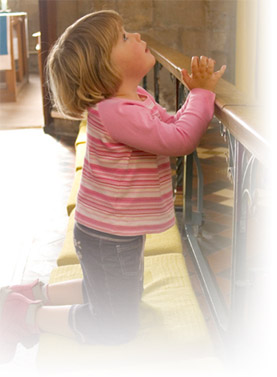Sunday Sermon for December 12, 2010, the Third Sunday of Advent, Year A
Readings: Is 35:1-6a, 10; Jas 5:7-10; Mt 11:2-11
In the first reading today we hear about rejoicing, exulting, singing, gladness and joy. We also hear about how the desert and the parched land will bloom with flowers and rejoice with joyful song. The rose colored vestments that can be worn at Mass today also elicit sentiments of hope and joy. What is this celebratory atmosphere about?
In the midst of a penitential season the Church places this day before us to remind us that the time of feasting draws near, that our penance will become life giving and the joy that follows from our penitential practices will be far greater than the deprivation we might be experiencing from the penances. Sadly, the idea that this is a time of penance may be foreign to many Catholics. Advent is not a time for lights and parties, but for prayer, quiet as we get our hearts and souls ready for Christmas. We need to recall that this is not of time of reparation as in Lent, but a time of watchful, prayerful preparation as we look forward to the celebration of our Lord’s birth.
At the same time, the Church also looks forward to the time of the second coming of our Lord. Meditation on His first coming leads us automatically to consider His return. While this is not the time for the second coming, we can all look fruitfully at the question of the day we will go forth from this world to see the Lord face to face. In that case, our fidelity, suffering and sacrifices required for the living out of the Christian life will be richly rewarded so that, once again, the sorrow of deprivation will turn into great joy.
This day is a reminder to us that our self denial will be worth it. Put it into the context of the season. A woman at eight and a half months gestation is often very uncomfortable, lacking sleep and suffering in a variety of ways, even to the point where there may be thoughts that it is not worth the struggles. However, during this time she is also preparing her heart and her home for the arrival of her child. In the midst of her discomfort, she works feverishly as her “nesting instincts” come out and she works through the pain and fatigue to make sure that everything is ready.
After all of this, and the labor and suffering of childbirth, one look at the beautiful face of her newborn infant not only erases the pain and discomfort of the past days and weeks, but she readily admits that it was all worth it. The joy far outweighs the sorrows and the desert of her deprivations brings forth life beyond what she could have imagined.
This is why the Church gives us the second reading which reminds us to be patient, to make our hearts firm and to guard against complaining about one another. We are even instructed to take as an example of hardship and patience the Prophets who spoke in the Name of the Lord. In the Gospel, Jesus speaks to the people about what they had gone out into the desert to see. The desert is the place of preparation and formation of the Prophets but, in this case, Jesus tells the people that St. John the Baptist is more than a Prophet.
We could say that St. John the Baptist lived in the desert both physically and spiritually. Physically, he was in the desert near the Dead Sea; spiritually he deprived himself of most every comfort we can imagine as he prepared for the task God had given him as the messenger sent before the Lord to prepare His way. It looks, on the surface, like a waste of a life: live in the desert, go to prison, be executed. But we know that the desert of his life bore great fruit, his voice continues to be heard echoing across the ages and he still serves as an example to us all.
He is a perfect example of what Advent is about, and what this day in the middle of Advent is about. He life was one of patience and penance in preparation for the coming of the Messiah, his self denial became life giving and his sufferings have turned into joy. This is the kind of example St. James speaks of in the second reading. If we are faithful to what this season is about, prayer and penance in preparation for the celebration of the birth of the Messiah or for the celebration of our birth into eternity (or the second coming, whichever comes first), then Christmas will be met with greater joy and a deeper meaning than it has in the past and our entrance into Heaven will be a cause for rejoicing, exulting, singing, gladness and joy.
Fr. Altier’s column appears regularly in The Wanderer, a national Catholic weekly published in St. Paul, Minn. For information about subscribing to The Wanderer, please visit www.thewandererpress.com.

